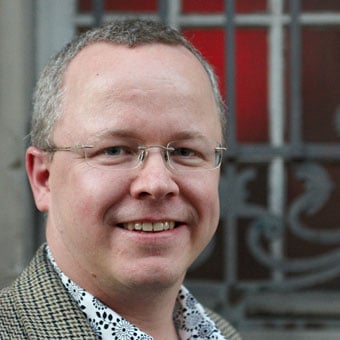
David Horne
An introduction to Horne’s music by David Allenby
David Horne, born in 1970, is one of the leading young musicians belonging to that talented Scottish generation which exploded onto the music scene in the 1990s. While still a teenager he established his name both as a pianist, making his BBC Proms concerto debut in 1990, and as a composer, with a prize-winning work at the Huddersfield Contemporary Music Festival. His composition studies took him to the USA, first at the Curtis Institute in Philadelphia where he studied with the doyen of American song composers Ned Rorem, and then at Harvard University, where he was recently appointed a Lecturer of Music while still in his 20s.
Horne’s music can be viewed as both a response and a reaction to modernism. His language is influenced by those modernist masters who have explored essentially abstract musical ideas. He has often said that he "just writes notes", meaning that his starting point is the very syntax of music itself, rather than the translation into music of an extra-musical idea or influence. That said, he has not restricted himself to abstract forms, but has readily embraced vocal and theatrical genres, and his range is wide enough to include both radical works which experiment with timbral transformation such as Glow or Filters and diatonic choral works intended for young performers like The Burning Babe and Praise Ye.
If Horne’s language and technique often pursue an extension of classic modernist preoccupations, the exuberant coloristic elaboration of line and harmony and the composer’s sheer communicative energy are a reaction to the too often hermetically sealed world of ‘New Music’. These characteristics were already apparent in his impressively fluent early pieces written around the age of 20, such as Splintered Unisons and Out of the Air, but blossomed into a distinctive style after his departure to the USA in such works as the Concerto for Six Players.
Escaping London’s hothouse for young composers, Horne could breathe the fresh air of the New World, enjoy its non-doctrinaire openness and hone his skills. A work such as Phantom Moon demonstrates his attractive lyricism, his lively ear for instrumentation, and his rhythmic energy. Here is a composer who has succeeded in writing genuinely fast music within a modern idiom, not just in terms of the sheer number of notes, but in the truer sense of rapidly shifting harmonic rhythm.
His communicative qualities have drawn leading virtuoso performers to commission works, including violist Nobuko Imai (Stilled Voices), percussionist Evelyn Glennie (Reaching Out), pianist Boris Berezovsky (Liszt) and cellist Fred Sherry (Zip). His ensemble scores such as Out of the Air and the Concerto for Six Players have been programmed internationally by the London Sinfonietta, the Birmingham Contemporary Music Group, the California EAR Unit, the Ensemble für neue Musik Zürich, Ensemble Diagonales, Ensemble T.M.Plus, and the Chamber Music Society of Lincoln Center. Most recently, Flex, a mini-concerto for piano and ensemble, has been performed successfully on both sides of the Atlantic with Horne as the soloist.
His experience in writing for the stage began with Jason Field, a compact psychological thriller for three voices and ensemble, and developed through the one-act chamber opera Travellers which won the Stephen Oliver Prize, and the dramatic cantata The Lie, to Beyond the Blue Horizon, a full-evening work for Trestle Theatre and the Britten Sinfonia, which combined mime, puppetry, and a richly variegated and resourceful ensemble score. This fertile training ground gave rise naturally to the composition of his first full-length opera, Friend of the People, commissioned by Scottish Opera for premiere in 1999 in a production by Christopher Alden.
The most exciting area of development in the coming years will undoubtedly be in the orchestral sphere, thanks to Horne’s position as Composer in Association with the Royal Liverpool Philharmonic Orchestra. This promises a range of new works for orchestra, chorus and orchestra, and for the RLPO’s contemporary music ensemble, and will involve the composer actively in a range of educational projects in the Liverpool area. It also signals a welcome presence for David Horne in the UK, after a period of compositional activity centred largely in the USA, and the return of a journeyman who, approaching his 30th birthday, has now achieved a new level of musical maturity.
David Allenby, 1999
